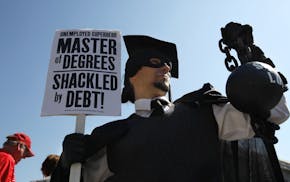One of the cruel ironies of proxy season, the time of the year when most companies tell us how much they paid their top executives, is that it comes when the rest of us are scrambling to file our tax returns.
Just when we're feeling poor, we're reminded of those who most definitely are not.
Like Stephen Hemsley, the CEO of UnitedHealth Group, who is still cashing in -- to the tune of $142 million the past two years -- on 10-year-old mega stock option grants. Or James Cracchiolo, the CEO of Ameriprise Financial, whose $18.8 million in total compensation included more than $9 million in "non-equity incentive pay." Cash, that is.
By now, you might think investors and the public would be desensitized to the size of these paychecks. Not so. Maybe it's the tough economy, but people seem angrier and more certain that every corporate executive is overpaid.
To that I say, no. Some CEOs deserve every penny they get. And directors, goaded by regulators, are finally responding to investor fury and reining in some of the abusive practices of the past.
Shareholders now having a say on pay practices could bring even bigger changes in the coming years. While the vote may be nonbinding, companies are discovering it carries more than symbolic clout.
Hewlett-Packard has been in damage control mode ever since shareholders said no to the pay package for its new CEO, Leo Apotheker, worth an estimated $85 million over the next five years. Johnson & Johnson, hoping to head off a similar result when its shareholders vote, defended CEO William Weldon's $28.7 million compensation in a letter to large institutional investors last week. In 2010, Weldon presided over 11 drug recalls, declines in both sales and stock prices, and the Food and Drug Administration's stepping in to supervise its consumer health care unit.
Also last week, General Electric, after "a number of constructive conversations with our shareowners," said it had changed the vesting formula on options awarded to its chief executive, Jeff Immelt.
"Companies are taking the vote seriously," said Aaron Boyd, head of research for Equilar, a compensation consulting firm based in Redwood City, Calif. "We're seeing more dialogue between companies and large shareholders, and more disclosure and context around pay practices and formulas."
Less common, too, are some of the hot-button compensation practices -- unlimited personal use of a corporate jet, paying taxes on those big stock option awards -- that have drawn special ire. Some companies, particularly those with frozen union pensions, have stopped funding supplemental retirement plans for top executives, and more are tightening the link between equity awards and company performance.
Some of these better practices have been in place for years at Select Comfort, the Plymouth-based maker of the Sleep Number mattress. In 2005, for example, Select Comfort began replacing traditional option and stock grants with performance-restricted versions of the same.
Instead of a fixed amount of shares or options that could be claimed on an anniversary date, awards can be increased by as much as half, or reduced by as much as 75 percent, based on performance.
Governance experts might quibble over the fact that Select Comfort executives are still entitled to share or option grants even if the company misses its profit goals. And last year, the company made a traditional grant of about 116,000 options to its CEO, Bill McLaughlin, and four other senior executives, that can be exercised over the next two years.
Then again, McLaughlin and his team have successfully led Select Comfort through the most perilous period in its history. After floating along on the housing bubble, the mattress company's sales plunged 25 percent in 2008, and Select Comfort's future looked very much in doubt.
The housing market hasn't come back, but Select Comfort has. Sales rose in 2010 for the first time in four years, thanks in part to new, lower-priced mattresses. Deep cost cuts helped flip a 2008 operating loss of almost $70 million into a 2010 operating profit of $52 million.
Yes, 900 jobs were lost along the way. Or you could say that 2,100 were saved.
McLaughlin, who gave up most of his salary in 2008, saw his total compensation increase to $6.5 million in 2010, largely through the exercising of options granted before the company began moving to performance-restricted awards.
The AFL-CIO's new website, Executive Paywatch (www.aflcio.org/corporate watch/paywatch/ceopay.cfm) concludes that CEOs of the 299 largest companies received, on average, $11.4 million in total compensation last year. In a study it performed for the New York Times, Equilar found that the median pay for top executives at 200 major companies was $9.6 million in 2010, a 12 percent increase from 2009.
Some of those CEOs are overpaid. Some of them are enjoying the fruits of a compensation system rigged to reward them no matter what.
But not all of them.
ericw@startribune.com • 612-673-1736

Wieffering: Time to get over debit card fees
For Thrivent and others, warnings were there

With billions in sales, some co-ops are big business
